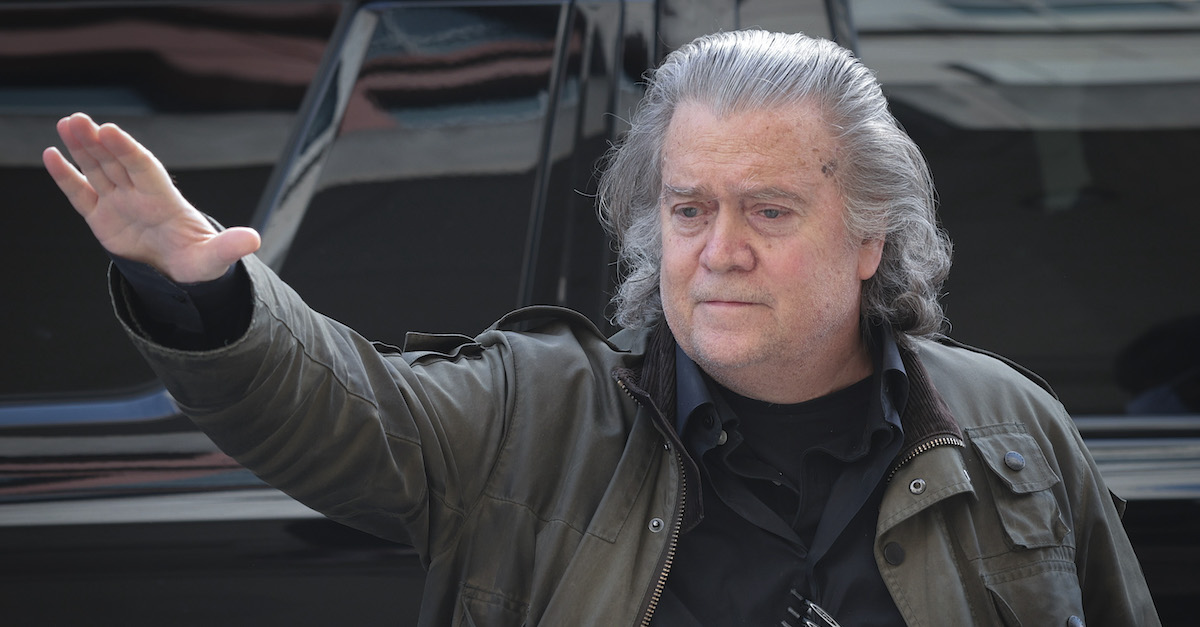
Former senior advisor to U.S. President Donald Trump Steve Bannon arrives at U.S. District Court for an appearance on March 16, 2022 in Washington, DC. Bannon has been charged with two counts of contempt of Congress after refusing to comply with a subpoena from the House Select Committee investigating the January 6 attack on the U.S. Capitol.
Steve Bannon, a onetime senior advisor to former president Donald Trump, must stand trial on criminal contempt of Congress charges, a federal judge in Washington, D.C. ruled on Wednesday.
During a hearing on several motions to exclude evidence and a motion to dismiss the case, Trump-appointed U.S. District Judge Carl Nichols sided with U.S. Department of Justice attorneys looking to avail the legislative branch’s little-used power to refer those who flout subpoenas for criminal prosecution.
Bannon was indicted after he refused to comply with a September 2021 subpoena issued by the Select Committee to Investigate the January 6th Attack on the United States Capitol.
According to the November 2021 indictment, Bannon was ordered to produce documents by Oct. 7, 2021 and to appear for an in-person deposition one week later. He never complied with either request, and he cited numerous arguments as to why he shouldn’t have to do so.
In his April 2022 motion to dismiss, the defendant argued that the subpoena was not lawfully issued because the Jan. 6th Committee has no genuine ranking member to protect the GOP’s interests, it lacks the requisite number of members under House rules, and because House Speaker Nancy Pelosi (D-Calif.) nixed four would-be GOP members. The committee, Bannon argued, is therefore improperly constituted.
Bannon additionally argued the subpoena should not apply to him because he is protected by executive privilege.
Last month, the government filed its reply, rubbishing the executive privilege argument by writing that “neither the current nor former President asserted executive privilege in a manner consistent with or allowing the Defendant to engage in total noncompliance.” Rather than an adjunct of the executive branch at the time of the attack on the U.S. Capitol Complex, the DOJ insisted, Bannon is “a private party subpoenaed to testify and provide documents to Congress about events that occurred long after he left the government.”
Casting the privilege issue as the defendant’s “principal grievance,” DOJ attorneys described his claims about the composition of the Jan. 6th Committee and House rules as “meritless” and argued that he could have raised them earlier but effectively “waived” those claims by only first making them in his motion to dismiss.
On Wednesday, however, Judge Nichols took Bannon’s argument about the Committee’s composition at face value, saying it was not “unreasonable,” but ultimately opting to give “great weight” to the House’s interpretation of its own rules, according to a report by The National Law Journal.
In the end, the judge said he “concluded that a judge ruling on internal House regulations would raise separation of powers concerns,” that report by journalist Andrew Goudsward says.
Bannon had also sought to cast his refusal to comply with the subpoenas as an issue of entrapment by estoppel – essentially a claim that a series of Office of Legal Counsel memos gave him the impression that there was no criminal liability that could possibly attach when someone in his position ignores a criminal subpoena.
Nichols addressed the merits of that argument as well – and found it lacking.
“None [of those OLC memos] involve the exact situation presented here,” he said.
The court issued its ruling from the bench.
A minute order entry on the federal docket notes:

Bannon’s trial is currently slated to begin on July 18, 2022.
[image via Win McNamee/Getty Images]
Have a tip we should know? [email protected]